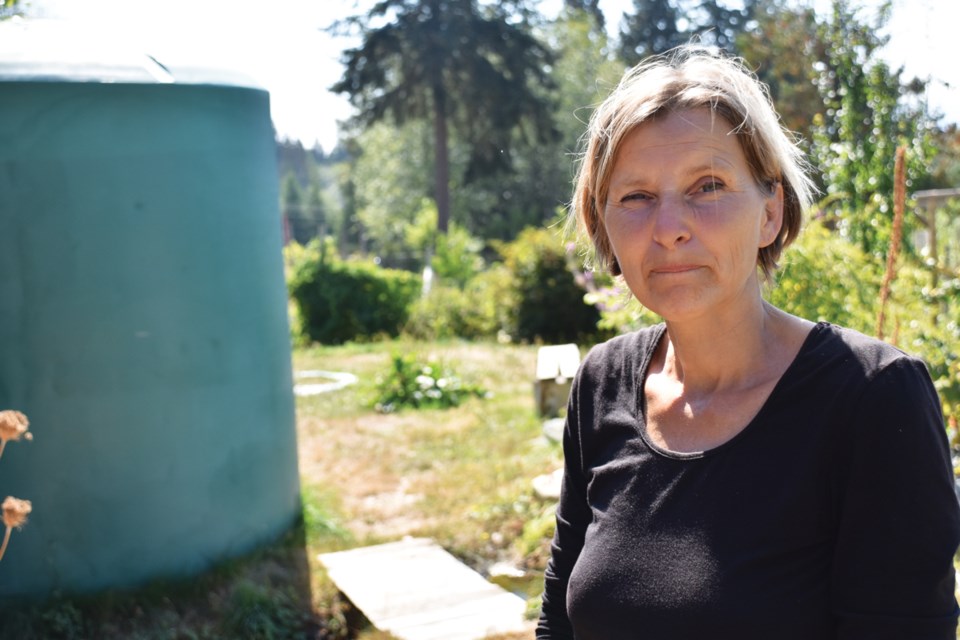Stage 4 water restrictions have been in effect for the majority of Sunshine Coast residents since Aug. 31. The complete ban on outdoor watering has left Coast farmers without clear direction on how to keep their crops alive.
According to Angie Legault, corporate officer with the Sunshine Coast Regional District (SCRD), there is no exemption from Stage 4 water restrictions for farms. In 2015, following a delegation of approximately 100 farmers and their supporters, the SCRD board voted to provide an exemption to metered farmers with B.C. farm status. But that exemption only lasted the year, which means the 65 farms on the Coast with farm status dependent on the Chapman System, as well as smaller growers without status, will have to wait for the restrictions to lift before watering.
Martin and Tracey Kiewitz own Henry Reed Produce in Elphinstone, one of the largest farms on the Chapman system. Their 10-acre farm produces poultry, eggs and up to 40 varieties of crops, supplying grocery stores and restaurants on the Coast. They are busy preparing water-sensitive seedlings for their winter crops. “We have had to keep watering or lose our crop,” said Martin Kiewtiz. They use plastic ground mulch and drop irrigation to reduce their usage and have begun studying water collection methods. “If that doesn’t work it’s going to have to be a well, which is quite an expensive venture,” Kiewtiz said. He said he has been in open communication with the SCRD about their water consumption and haven’t been asked to stop watering.
Michelle Young, who manages Ruby’s Run Urban Farm in Sechelt, does not have farm status yet. The farm’s produce is sold at the Sechelt Farmers’ Market and has a stand outside the property. Meters have yet to be installed in the District of Sechelt but she had requested that SCRD install one and classify her as a small commercial customer to pay a metered rate, but she is still waiting for that to happen. “We have turned off and disconnected all the drip irrigation that we use for the entire farm. The crops in raised beds will be good for about another week,” said Young.
In the meantime they are transporting water from another property with an independent water source, which they also did in 2015 during Stage 4. Young said she is disappointed commercial farms are restricted from using the non-potable water Sechelt has made available to the public and that the District hasn’t yet done anything with the reclaimed water at the Water Resource Centre. “If we were able to carbon filter this and use this for growing, many of us wouldn’t even need one drop of SCRD water in the first place,” she said.
Quitting SCRD water – or becoming far less reliant on it – is the endgame farmer Annette Clarke has resorted to. “Since the 2015 drought we started really seriously thinking about what to do,” said Clarke. “I don’t want to blame it all on the SCRD but I must say there was absolutely no help coming from that side, so we thought what can do ourselves with the resources we have?”
She, along with Dale Peterson, spearheaded the delegation in 2015 that won the exemption from the SCRD to water their crops during Stage 4, but said little has been done to promote water conservation among farmers and protect their livelihoods since. In 2015 she was raising chickens and growing vegetables on her metered three-acre farm in Roberts Creek but has since switched crops and launched a new business called Exotic Fruit Nursery. “We are specializing now on fruit trees because they need less water,” she said.
She has also been investing heavily in water storage. Several ponds have been installed for emergency water supply, in addition to one 2,000-gallon tank, three 1,000-gallon tanks, gutters to connect them and a drip irrigation system. “I’m over $10,000 of investment now,” she said, and that’s before installing a pump and hosing to connect the system.
Her potted trees, worth $20,000, must be watered, in addition to new trees in the ground and she is using one of her tanks, as well as a kids’ pool, to water her crops. “I’m trying to use grey water, but again, it’s not legal,” she said. “Our hands are tied in that way.” She said with strict rationing she has enough to last up to a week or two. “You lose your whole farm if you get shut off even for a few weeks,” said Clarke.
When asked whether she plans to fight for another exemption this year, Clarke said she wishes she could but is too busy. “We’re swamped with work because I need to do a lot by hand and can’t use a hose. I just don’t have the time right now,” she said.



